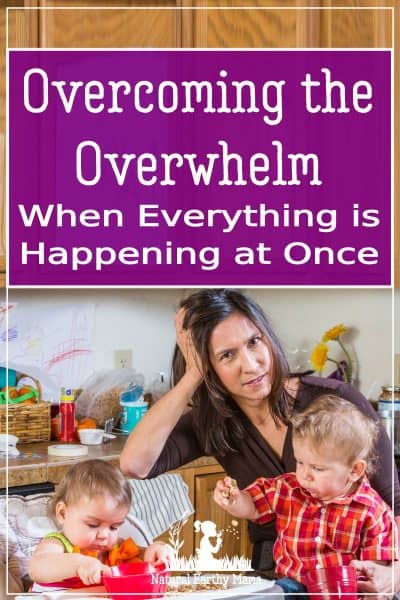 Is life getting too much for you? Overwhelmed by too much to do?
Is life getting too much for you? Overwhelmed by too much to do?
Need some help reducing stress in your life? Family life can be overwhelmingly stressful for the best of us!
Please read: This information is provided for educational purposes only and is not intended to treat, diagnose or prevent any disease. We encourage you to make your own health care decisions in partnership with a qualified health care professional.
This post contains affiliate links, this means at no extra cost to you, we make a commission from sales. Please read
our Disclosure Statement
Here are some great strategies that you can start using today to help overcome stress and reduce the overwhelm in your life.
Anxiety and Overwhelm
Anxiety and depression are so common these days, and they are made so much worse when you are feeling overwhelmed.
It is one of those spiral things: the more overwhelmed and stressed you are, the more anxious you feel, and the more anxious you are, the less you will cope and the more stressful life will feel and the more overwhelmed you will feel.
However, there is hope! Below I go through some simple steps that you can take, broken down in to little pieces, so that you can start to take control of the situations that are stressing you out.
RELATED POST: What I wish I knew before the birth of my baby
Family Life is Overwhelming
It all starts when you get pregnant. Suddenly you have more to organize and less energy. It can snowball out of control when you are handed your newborn and no operation manual!
Postpartum anxiety and postnatal depression are more common than we realize and as a society we are not good at recognizing the signs or supporting the mama’s who are struggling.
RELATED POST: The ultimate guide to PND and anxiety
The more children you have to organize and the more schedules you have to sinc together, the harder it can become.
Certain times of the years are more busy than others, and sometimes it can seem like it is just too much to physically fit in one day.
12 Steps to Reduce Stress When Life is Busy
Below are some steps that you can take to reduce stress and eliminate the overwhelm.
1. Take Stock
The first thing you need to do it set aside time to take stock of everything that is going on.
Get some pens and paper or a note book and start making a list.
What have you got on this week that needs done?
When?
With who?
What do you need to prepare for each task?
How important is this activity?
Include the normal day to day tasks as well – groceries, housework, gardening, laundry, family commitments, church, appointments.
2. Prioritize
Look through the list for this week (or even this month), and look for the important stuff. What could you really reschedule to a less busy time?
Is there stuff there that you can simply skip this week? Do you really like that activity enough to keep going? Is it really feeding in to you and your family, are you benefiting from it?
What is REALLY urgent, what is pretty important, and what can you let slide, outsource, or reschedule?
Mark the activities – URGENT, important and reschedule.
3. Learn to Say No
Saying no is HARD, I get it. It is however one of the best skills you will learn. If there are things on your task list or schedule that you simply don’t want to do, it is OK to say no.
If saying it out loud is too hard (ugg I HATE talking on the phone to people!) try writing it in an email.
Emails are my favorite because you can think about what you want to say. Write it and then walk away for a bit, come back and re-read it, adjusting the tone as appropriate, then send it.
A good way of saying no can be as simple as:
“Hi [name],
I feel really bad about it, but I have a lot on my plate right now, and I am going to have to say no to doing xxxx. I really hate to let you down, but something had to give. I hope you find someone else to help with it.
All the best,
{your name]”
4. Make a Schedule
One of THE BEST things I did for our family was to buy a white board and put it up in the living area just like this one.
I have put Monday – Sunday spaces on it, and some room at the bottom to write upcoming events and other things I have to remember (like what my kids want for their birthday!)
I used permanent marker to add in the activities that happen every week, and we use dry eraser pens for the activities that vary.
And it is color coded – Blue for kids activities, black for me, red for hubby. The kids move a magnet from day to day to keep track of what we are up to today and it saves me telling all 3 of them separately what is happening each day!
If you prefer to use a diary on your computer or on your phone, set tasks to repeat so you don’t have to remember to keep entering them each week.
If you use a physical diary you will need to copy over the weekly activities each week.
5. Reschedule Appointments
Anything in your list that you decided you can reschedule, stop going to, or miss a week or two, work your way through the list and make the calls or emails required to postpone, cancel or apologize.
6. Organize the House
Nothing is more frustrating than running late for something with screaming kids, only to discover you can’t find your keys, or your phone, or a shoe.
The more organized your home and your life, the less overwhelming it will be.
Find a home for everything, and they put things there when you are done with them. Boxes, bins and labels are your friend.
A tray or bowl by the front door is perfect for keys. Have a spot in the living room that you keep your phone, the TV remote and USB memory sticks.
Buy some big tubs for the kids toys and keep them separated in to the set or type that they all. All the cars and tracks in one box, all the dolls and toy food in another etc. Label them well and find them a home.
Take rubbish to the tip, re-home things that you no longer need and generally clear the space of clutter.
Because this is SUCH a big topic, Hilary from Pulling Curls has put together a course aimed at helping you to take control and organize your house and life. You can check it out here.
7. Clean and Tidy
Keeping your house and car clean and tidy might be the last thing on your mind when life is too busy to function. BUT you will find that if you can tidy it up on a day that is less busy, keeping it tidy becomes less difficult.
Implementing a chore chart in our house was a life changer. At the time my kids were 4, 8 and 10.
Each morning before they get to do anything they want to do, they have to have:
- A tidy room
- Fed their pets (they have rabbits, cats, fish and birds)
- Done their ‘job’ for the day
The jobs for the day rotate, but twice a week they empty the dishwasher or wipe down the countertop and dinner table and once a week each they cook dinner.
This means that we start the day with a tidy countertop, tidy and clean table and empty dishwasher and it sets us up for a more tidy, less cluttered day.
Visual clutter is read by your body as stressful, the more you can avoid this, the better.
8. Have Realistic Expectations
Obviously, housework will not always be priority number one. I do make having a clear counter top a priority, otherwise it is a disaster at the end of the day.
However, despite having a very large dog in the house, sometimes I don’t vacuum for a week. And no one has died.
There is really only 24 hours in a day, and to function healthily, you need to spend 8 of those asleep.
Don’t expect too much of yourself, and stop looking at all the beautiful homes on social media. What you see is not what you get.
Kids will be kids.
They make mess, they draw on stuff while you aren’t watching. You vacuum the floor and they follow you with a crumbly cookie…
It is life.
And it is OK to leave those crumbs there till you vacuum again. Or the dog gets them. Or the baby. Or the mice for that matter.
Another mama visiting you will not judge you. Do you know what? They will feel more relaxed with you knowing that you are normal too.
9. Let Some Things Go
You don’t have to take your toddler to 4 activities a week. By all means, if you love it, go. But don’t feel like you have to.
Baby swimming classes are pricey and don’t really improve a child’s swimming ability.
Same goes for dance classes, music lessons and sports. Kids need time just to be kids.
Save your time and your money and all that stress and go to the park with them, play ball with them, or let them finger paint on your windows.
10. Prepare Ahead of Time
If you have a lull in all your activities or know that a busy time is looming, try to get prepared.
Make some freezer meals ahead of time, do some organizing of a room or two, or just take some time to make some schedules.
The better prepared you are, the less overwhelmed you will feel when you get busy.
11. Make Time for Yourself
This really should be up at the top near number one. If you aren’t taking some time to refill your own bucket, you will have nothing to give to anyone else.
What do you really love to do?
Schedule that in regularly in to the week’s planner. Make yourself a priority.
Generally people get their buckets filled in one (or two) of 5 ways. These are known as the 5 love languages.
- Words of affirmation – Well done, I love you, you are worth fighting for
- Physical touch – a cuddle, a kiss on the forehead, a back rub
- Quality time – a coffee date, games night
- Gift giving – a bunch of roses, that book you wanted
- Acts of service – cooking dinner, a weeded garden
You may also really like spending time alone, or time with people. I am an introvert and need time to myself to recharge, my hubby is an extrovert and needs people to recharge.
Here introvert doesn’t necessarily mean shy and recluse, and extrovert doesn’t mean a loud and bubbly person. In this instance it is talking about how you gain energy.
If you get “peopled out” you are probably an introvert. If you get “bored and lonely” you are more likely to be an extrovert.
Do something that makes YOU happy.
12. Get Some Help
Sometimes we genuinely cannot do it alone. And that is OK.
Sometimes we need professional help because our anxiety and or depression is too much for us, and that is OK too.
There is no shame in asking for help. We are humans and we were built to live in a village, a tribe, a real community. When mamas were overwhelmed, others step in and help.
Sadly, we have moved away from this model of living and we all have a facade of everything being great.
“How are you?” “Good” that is the normal response. But if it isn’t true, we need to be honest with our village.
Finding a village isn’t easy, but joining a local playgroup is a great place to start. Make some real connections with people. Be honest about life, and watch them be honest too.
This is how real friendships are built. Not making up a rubbish excuse for not coming, but being real enough to say, “Actually, I am having a rough time even getting out of bed at the moment, let alone getting out of the house. Life is all a bit much for me right now.”
And when they respond with love and offers of help, be gracious and real enough to accept them for what they are.
You don’t have to repay them.
This is real friendship.
This community.
This is love.
We need this.
The more we are real with our friends, the more they will feel safe to be real with you. Build these connections, this is what life is really about.


